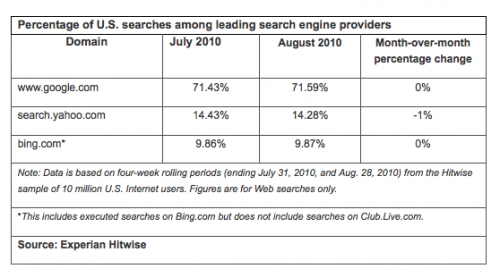Nielsen: Bing Passes Yahoo To Become #2 Search Engine
According to Nielsen data out this morning Microsoft’s Bing has passed Yahoo to become the number two search engine in the US. Nielsen says that Google’s August share is 65% (and growth is flat) but that Bing and Yahoo have now switched places: Although Google saw little change in its month-over-month search volume, it still […]
According to Nielsen data out this morning Microsoft’s Bing has passed Yahoo to become the number two search engine in the US. Nielsen says that Google’s August share is 65% (and growth is flat) but that Bing and Yahoo have now switched places:
Although Google saw little change in its month-over-month search volume, it still dominates the search market, accounting for 65% of all U.S. searches. Yahoo! followed Google and MSN/Windows Live/Bing Search with a 13.1% share of U.S. searches, falling from a 14.6% share in July 2010 to 13.1% (a 1.2% delta decrease or an 8% relative decrease).
In terms of a year-over-year comparison, Google has seen little change in its share of search while Yahoo! has seen a small but steady decline, going from a 16% share to 13.1% (a delta drop of 2.9% or a relative drop of 18%). MSN/Windows Live/Bing’s share has grown from 10.7% in August 2009 to 13.9% (a delta increase of 3.2% or a relative increase of 30%).

Source: Nielsen
Nielsen says that it only counts “intentional” searches and not slideshows or “contextual searches.”
By contrast comScore shows Yahoo growing and six points ahead of Bing, according to the firm’s July “explicit core search” numbers:
The most recent Hitwise data also show Yahoo still in second position:
Nielsen told us that Bing’s growth has come largely at Yahoo’s expense. The other numbers above argue that it’s too early to anoint Bing as the confirmed number two. But that would appear to be its trajectory.
Ad network Chitika found Yahoo to have been overtaken by Bing back in January: Chitika: Bing Passes Yahoo In Search Market Share.
A separate article in the Wall Street Journal this morning, which discusses the Verizon-Bing “default” mobile search deal, cites comScore data that show Bing’s share of mobile searches is very small, although growing:
In July, only 1.7% of U.S. cellphone customers surveyed by comScore had used Microsoft’s search technology, although that was up from 1.2% a year earlier. By contrast, 14.4% of those surveyed had used Google search, up from 9.3% a year earlier.
A Bing spokesperson quoted in the article says the Verizon deal has helped grow its mobile search query share:
Microsoft says the Verizon deal has helped the volume of mobile searches on Bing more than triple over the past year. “It’s a long-term strategic deal for us,” a company spokesman said. “It will continue to be one of the most important things we’re doing here at Bing in terms of mobile search.”
My guess would be that the Bing iPhone app is as least as important to Microsoft’s mobile search query volume. According to comScore survey data, Yahoo is also in second position in US mobile search. Another estimate recently put Google’s mobile search share at above 98 percent.
When Bing launched early last year I wrote:
Given the strength of Google’s brand and its “ownership” of search Bing may struggle to make market share gains. However I predict that it will gain share. Those potential gains may come not at Google’s expense but rather from Ask, AOL or even Yahoo.
If Yahoo does slip to a consensus number three people will inevitably explore the question of whether the Yahoo-Microsoft deal and the loss of many key Yahoo search personnel is to blame or whether Microsoft’s huge investment in Bing would have eventually lifted it past Yahoo regardless.
Contributing authors are invited to create content for Search Engine Land and are chosen for their expertise and contribution to the search community. Our contributors work under the oversight of the editorial staff and contributions are checked for quality and relevance to our readers. The opinions they express are their own.
Related stories
New on Search Engine Land

